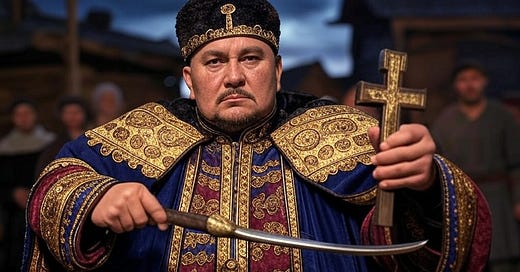Kyiv: The Eternal Hostage of Moscow's Imperial Ambitions
Moscow has long built its ideological foundation on its connection to the historical legacy of Rus’, creating the narrative that the capital of Ukraine—Kyiv (as the center of Rus’ and essentially Rus’ itself)—is a fundamental component of its identity.
This perspective supports not only a mythical but also a geopolitical and ideological concept of Moscow as the "Third Rome," which defines its status on the global stage.
Without Ukraine, Moscow loses not only its mythical historical legitimacy but also the symbolic connection to its imperial heritage, making the existence of an empire in the traditional sense impossible. Meanwhile, Moscow's attitude toward other former colonies of the Russian Empire or the USSR is of a completely different nature.
On January 11 (new style), 1918, the Council of People’s Commissars, led by Lenin, recognized the independence of “Turkish Armenia” (“Western Armenia”). This issue was overseen by Joseph Stalin, who signed the corresponding decree. The territories in question had been occupied by the Russian army during World War I and were supported by local separatist movements. In this case, the recognition of independence concerned territories of the Ottoman Empire, making it more of a temporary tactical concession rather than a strategic decision.
The Bolshevik approach to the national question in the early 20th century was pragmatic. The recognition of the independence of Poland, Finland, and a number of other territories was dictated not by a genuine commitment to supporting the right of peoples to self-determination but by purely political expediency. In the case of Poland, this policy was established by the Provisional Government, and the Bolsheviks saw no reason to challenge it. Finland, with its political maturity and readiness to resist, also fell outside the scope of Bolshevik claims.
However, Ukraine has always held exceptional significance for Moscow. Its geographical location, historical role in the formation of Rus’ statehood, and resource potential prevent Moscow from considering it as a region separate from the empire.
A cohesive Ukrainian organic national identity, developing independently of the imperial “Russian” identity, completely undermines the foundations of the “Third Rome” ideology. This is why Moscow’s propaganda machine constructs narratives about the mythical “triune people” and “historical unity,” categorically denying Kyivan Rus’ and Ukraine the right to their own distinct history and independent future.
When comparing this approach with the recognition of the independence of “Turkish Armenia,” it is worth noting that this territory was never an integral part of Moscow's imperial core, and its strategic importance was limited to a temporary military-political context. The recognition of independence was more of a diplomatic maneuver than a reflection of imperial necessity.
Another important factor is how Moscow employs historical myths. In the case of Ukraine, the narrative centers on the mythical “Ancient Rus’,” declared to be the origin of Russian statehood. In contrast, other territories lack such deep symbolic connections. Thus, the fate of “Turkish Armenia” or even such significant regions as Poland or Finland could be decided based on the current situation, while Ukraine has always remained at the heart of imperial ambitions.
Moscow’s contemporary rhetoric regarding Ukraine demonstrates the continuity of this approach. In today’s world, where empires no longer hold the legitimacy they once did, Moscow clings to the past, trying to maintain the illusion of historical rights over Ukraine. Yet historical paradoxes show that the more a country tries to hold on to what is already lost, the faster it loses its own future.



